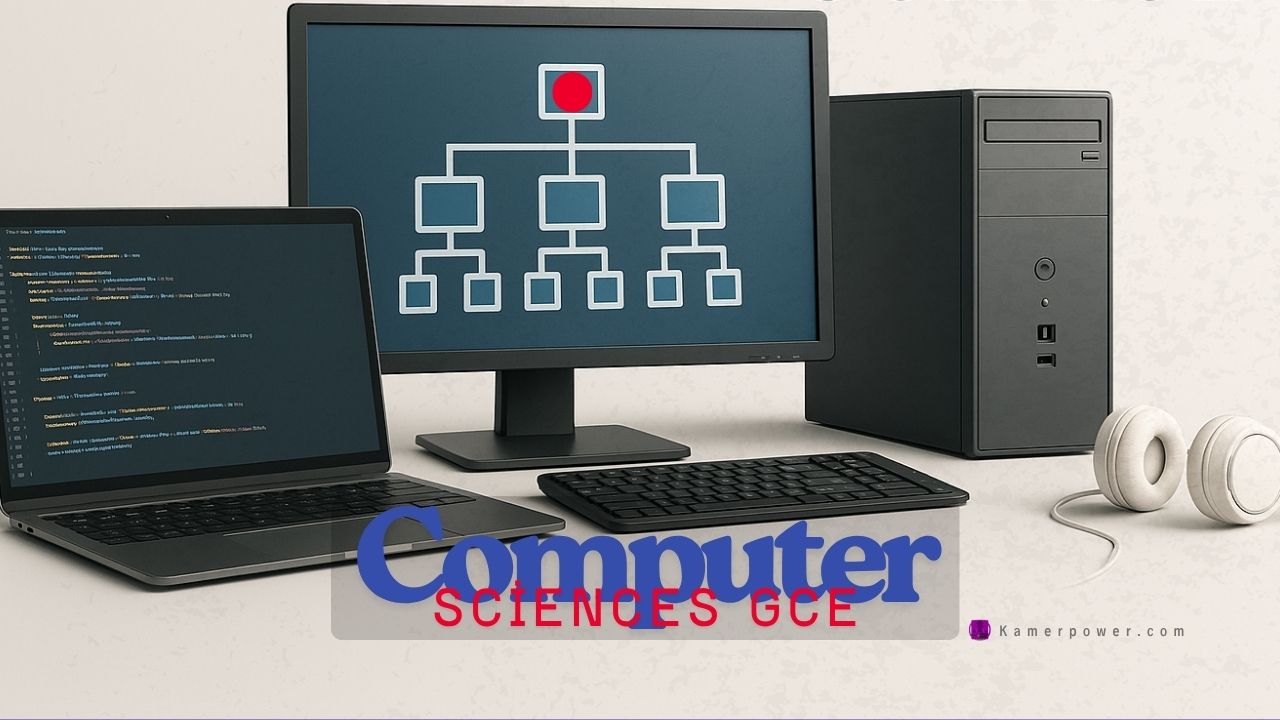Computer Science Terminologies & Computer Characteristics
Back to: Revision Computer Science GCE A/L – Past Questions / Answers
Contents
Key Terminologies in Computer Science and Fundamental Computer Characteristics
Computer Science Course Cameroon GCE.
Computer Science Course GCE A Level Cameroon. Computer science is the study of processes that interact with data and that can be represented as data in the form of programs. It enables the use of algorithms to manipulate, store, and communicate digital information. A computer scientist studies the theory of computation and the design of software systems.
Its fields can be divided into theoretical and practical disciplines. Computational complexity theory is highly abstract, while computer graphics emphasizes real-world applications. kamerpower.com
Programming language theory considers approaches to the description of computational processes, while software engineering involves the use of programming languages and complex systems. Human–computer interaction considers the challenges in making computers useful, usable, and accessible. Computer Science Course GCE A Level Cameroon.

Theoretical Computer Science is mathematical and abstract in spirit, but it derives its motivation from the practical and everyday computation. Its aim is to understand the nature of computation and, as a consequence of this understanding, provide more efficient methodologies. All studies related to mathematical, logic and formal concepts and methods could be considered as theoretical computer science, provided that the motivation is clearly drawn from the field of computing. Computer Science Course GCE A Level Cameroon.
- Data structures and algorithms.
- Theory of computation.
- Information and coding theory.
- Programming language theory.
- Computer architecture and computer engineering.
- Computer performance analysis.
- Concurrent, parallel and distributed systems.
- Computer networks.
- Computer security and cryptography.
- Databases.
- Computer graphics and visualization.
- Human–computer interaction.
- Scientific computing and simulation.
- Artificial intelligence.
- Software engineering.
Explanation of Key Terms in Computer Science
– Computer:
The word “computer” comes from the word “compute”, which means “to
calculate”. A computer is then an electronic device for performing logical and
mathematical operations based on its programs.
– Computer Literacy:
Computer literacy is defined as the knowledge and ability to utilize computers and related technology efficiently. It can also refer to the comfort level someone has with using computer programs and other applications that are associated with computers.
– Computer science:
Computer science is a branch of science that studies the principles and use of computers.
– ICT (Information Communication Technology):
This is the application of modern communications, computing and digital technologies to create, store, exchange and use information in its various forms.
– Computing:
This is the act of developing and using the computer to perform an activity. It includes the designing and building of hardware and software systems for a wide range of purposes, processing and managing various kind of information, doing scientific studies using computers, …
– Data processing:
Computer data processing is any manipulation that uses a computer program to enter data and summarize, analyze or otherwise convert data into usable information.
– Program:
The set of instructions provided to the computer to solve a certain problem is called a program, and the one who develops this program is called a programmer.
– Data:
Data is what we feed into the computer. There are raw facts (text, image, sound, …) that still need to be processed (organized and arranged) into a form that can be understood and used, and later stored. Examples: population statistics, blood samples in a hospital, pictures.
– Information:
This is meaningful and useful material that is derived from the processing of data. Information is what comes out as output. Example: Result of laboratory test, the percentage of success on GCE, …
– Computer user :
That is somebody with little or no technical knowledge of computers, but who can use the computer to create specific documents and to communicate.
Characteristics of Computers
Computers exhibit several defining characteristics that distinguish them as powerful tools for data processing and information management:
1- Extensive Storage Capacity: Computers possess the ability to store vast amounts of data and retrieve required information rapidly and efficiently.
2- Autonomous Execution of Instructions: Once programmed, a computer can execute a series of instructions automatically without further human intervention.
3- Network Connectivity and Communication: Modern computers can establish connections with remote systems, enabling seamless information exchange and resource sharing across networks.
4- High Processing Speed: Computers are capable of performing complex computations and data manipulations at exceptionally high speeds, significantly surpassing manual processing.
5- Accuracy and Precision: Computational tasks performed by computers yield highly precise and reliable results, minimizing the likelihood of errors in data processing and analysis.